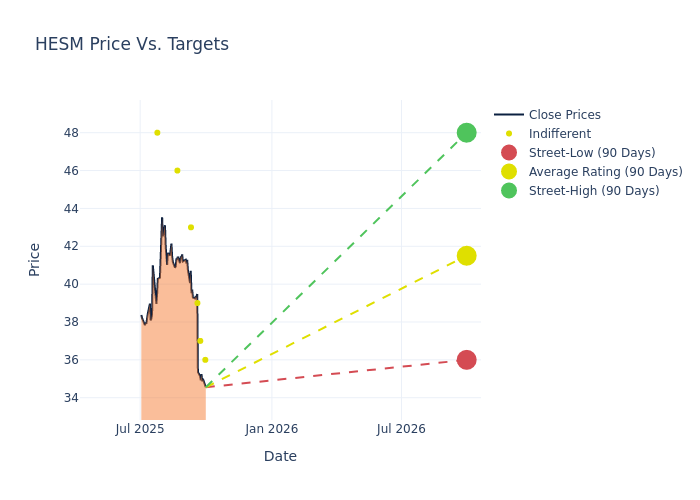9 Analysts Have This To Say About Hess Midstream
9 analysts have shared their evaluations of Hess Midstream (NYSE:HESM) during the recent three months, expressing a mix of bullish and bearish perspectives.
In the table below, you'll find a summary of their recent ratings, revealing the shifting sentiments over the past 30 days and comparing them to the previous months.
| Bullish | Somewhat Bullish | Indifferent | Somewhat Bearish | Bearish | |
|---|---|---|---|---|---|
| Total Ratings | 0 | 2 | 7 | 0 | 0 |
| Last 30D | 0 | 0 | 1 | 0 | 0 |
| 1M Ago | 0 | 0 | 4 | 0 | 0 |
| 2M Ago | 0 | 1 | 1 | 0 | 0 |
| 3M Ago | 0 | 1 | 1 | 0 | 0 |
Analysts have recently evaluated Hess Midstream and provided 12-month price targets. The average target is $42.78, accompanied by a high estimate of $48.00 and a low estimate of $36.00. Experiencing a 2.77% decline, the current average is now lower than the previous average price target of $44.00.

Interpreting Analyst Ratings: A Closer Look
The standing of Hess Midstream among financial experts is revealed through an in-depth exploration of recent analyst actions. The summary below outlines key analysts, their recent evaluations, and adjustments to ratings and price targets.
| Analyst | Analyst Firm | Action Taken | Rating | Current Price Target | Prior Price Target |
|---|---|---|---|---|---|
| John Mackay | Goldman Sachs | Announces | Neutral | $36.00 | - |
| Douglas Irwin | Citigroup | Lowers | Neutral | $37.00 | $41.00 |
| Praneeth Satish | Wells Fargo | Lowers | Equal-Weight | $39.00 | $48.00 |
| Spiro Dounis | Citigroup | Lowers | Neutral | $41.00 | $42.00 |
| Manav Gupta | UBS | Lowers | Neutral | $43.00 | $45.00 |
| Jeremy Tonet | JP Morgan | Raises | Neutral | $46.00 | $44.00 |
| Praneeth Satish | Wells Fargo | Raises | Overweight | $48.00 | $47.00 |
| Praneeth Satish | Wells Fargo | Raises | Overweight | $47.00 | $41.00 |
| Robert Kad | Morgan Stanley | Announces | Equal-Weight | $48.00 | - |
Key Insights:
- Action Taken: Responding to changing market dynamics and company performance, analysts update their recommendations. Whether they 'Maintain', 'Raise', or 'Lower' their stance, it signifies their response to recent developments related to Hess Midstream. This offers insight into analysts' perspectives on the current state of the company.
- Rating: Analysts assign qualitative assessments to stocks, ranging from 'Outperform' to 'Underperform'. These ratings convey the analysts' expectations for the relative performance of Hess Midstream compared to the broader market.
- Price Targets: Delving into movements, analysts provide estimates for the future value of Hess Midstream's stock. This analysis reveals shifts in analysts' expectations over time.
Assessing these analyst evaluations alongside crucial financial indicators can provide a comprehensive overview of Hess Midstream's market position. Stay informed and make well-judged decisions with the assistance of our Ratings Table.
Stay up to date on Hess Midstream analyst ratings.
All You Need to Know About Hess Midstream
Hess Midstream LP owns, operates, develops, and acquires a diverse set of midstream assets and provides fee-based services to Hess and third-party customers. It conducts its business through three operating segments: gathering, processing and storage, and terminaling and exporting. The company derives the maximum revenue from the gathering segment. Its gathering segment consists of the following assets namely Natural Gas Gathering and Compression; Crude Oil Gathering and Produced Water Gathering and Disposal.
Hess Midstream: Delving into Financials
Market Capitalization Analysis: Positioned below industry benchmarks, the company's market capitalization faces constraints in size. This could be influenced by factors such as growth expectations or operational capacity.
Revenue Growth: Over the 3M period, Hess Midstream showcased positive performance, achieving a revenue growth rate of 13.41% as of 30 June, 2025. This reflects a substantial increase in the company's top-line earnings. As compared to its peers, the company achieved a growth rate higher than the average among peers in Energy sector.
Net Margin: Hess Midstream's net margin excels beyond industry benchmarks, reaching 21.84%. This signifies efficient cost management and strong financial health.
Return on Equity (ROE): Hess Midstream's ROE stands out, surpassing industry averages. With an impressive ROE of 14.61%, the company demonstrates effective use of equity capital and strong financial performance.
Return on Assets (ROA): The company's ROA is a standout performer, exceeding industry averages. With an impressive ROA of 2.08%, the company showcases effective utilization of assets.
Debt Management: The company faces challenges in debt management with a debt-to-equity ratio higher than the industry average. With a ratio of 5.85, caution is advised due to increased financial risk.
The Significance of Analyst Ratings Explained
Benzinga tracks 150 analyst firms and reports on their stock expectations. Analysts typically arrive at their conclusions by predicting how much money a company will make in the future, usually the upcoming five years, and how risky or predictable that company's revenue streams are.
Analysts attend company conference calls and meetings, research company financial statements, and communicate with insiders to publish their ratings on stocks. Analysts typically rate each stock once per quarter or whenever the company has a major update.
Some analysts publish their predictions for metrics such as growth estimates, earnings, and revenue to provide additional guidance with their ratings. When using analyst ratings, it is important to keep in mind that stock and sector analysts are also human and are only offering their opinions to investors.
Breaking: Wall Street's Next Big Mover
Benzinga's #1 analyst just identified a stock poised for explosive growth. This under-the-radar company could surge 200%+ as major market shifts unfold. Click here for urgent details.
This article was generated by Benzinga's automated content engine and reviewed by an editor.
 Nasdaq
Nasdaq Wall Street Journal
Wall Street Journal